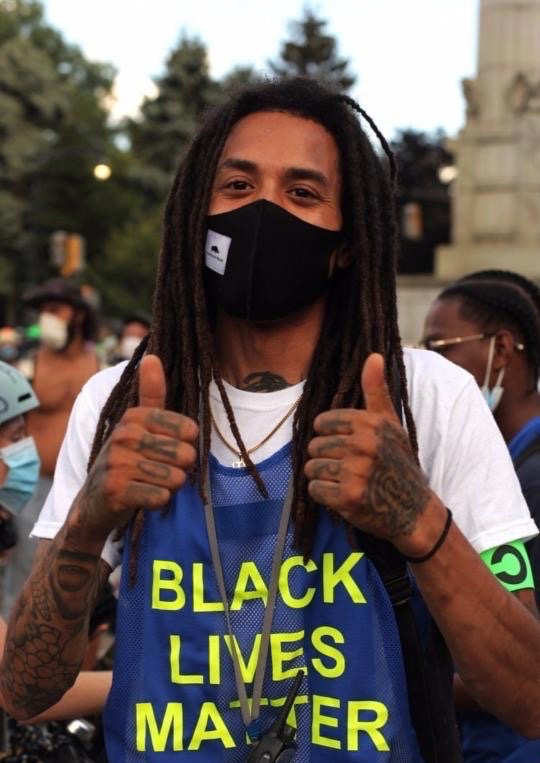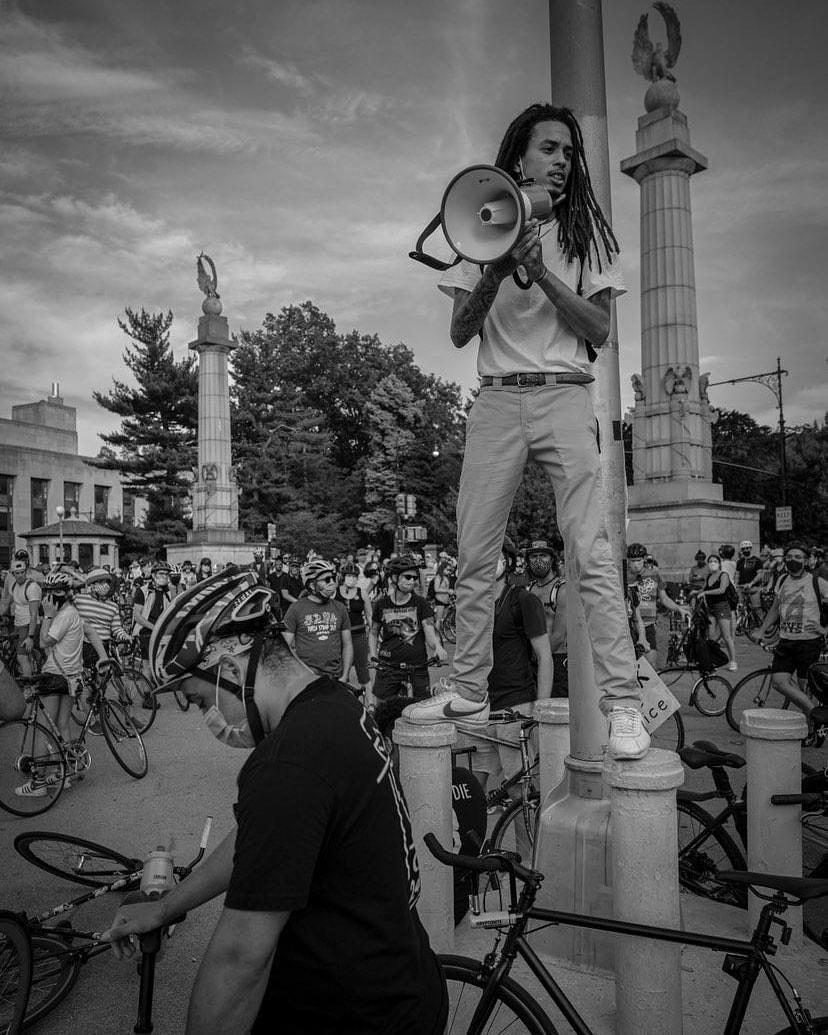Hundreds of bikers rode down Eastern Parkway last week, into Brownsville, and up to Queens before ending more than two hours later in Dumbo — all following one of the leaders who founded Street Riders, a new group that organizes protest rides in support of the Black Lives Matter movement.
The miles-long ride that started at Grand Army Plaza on June 12 encompassed stretches of unpaved and cracked streets — a basic example of racism in the form of infrastructure neglect. The stark difference between often-broken streets in lower-income communities of color and well-paved streets with protected bike lanes in wealthier, whiter neighborhoods is just one of the reasons why people are protesting, said Orlando Hamilton, one of Street Riders’ six founders.
“Our last ride we went through Bushwick and certain parts of Ridgewood and every block it was like, ‘Everybody ride slow’ because there were excessive potholes and glass in the street. Once we got to Dumbo it was just smooth sailing. We try to show that in our bike protest,” said Hamilton. “Where my mom lives in Bed-Stuy off Eastern Parkway, there’s no bike lanes. It’s not even nice roads, as soon as you go over to Williamsburg or Boerum Hill and Clinton Hill, the streets are smooth. It’s so obvious and blatant.”
Made a sign that blew away :( It said
— Courtney Williams (@BrownBikeGirl) June 9, 2020
"#BLM for Bikes
1) Bikes lanes in POC neighborhoods
2) Prioritize safe street redesign for POC neighborhoods
2) No excuses - #bikeshare in POC Neighbrohood "
These policy are the bike ways #bikenyc needs to show up long term. https://t.co/8nuWVuwocA
Hamilton said he purposely led the massive group of cyclists through predominantly low-income communities of color to highlight those differences, and to show neighbors there that the protests are for them too — after previous protest rides didn't venture as far.
“We noticed that there was rarely any protests, if any, going that way. That’s a big part of it for us. My mom lives on Eastern Parkway and it was the first time she’s seen any going that way,” he said. “And Ridgewood, those communities haven’t seen any protests. We want to ride that way and let them know, ‘We’re here for you, too.’"
But besides being a symbol of protest, the bike also acts as a physical tool — offering protection as a means to escape a potentially dangerous situation quickly, and a barrier between police and people.
“Biking is probably one of the most valuable tools I think the protestors have that’s legal. We don't get issued batons or helmets to protect us from police, like they have. It’s just really a barrier, and a mode to get away fast, especially when curfew came around,” said Hamilton.
Hamilton, a chef who moved to Brooklyn from Los Angeles about a year-and-a-half ago, says he’s already experienced his fair share of police harassment while biking on the streets of New York City.
“It’s all just the image, if you’re black doing what would seem to be just a regular day-to-day activity, it can be used as a reason to stop you or frisk you, or to accuse you. I've been pulled over just riding my bike in New York, ‘What’s the backpack for,'" he said.

The response from the bike community has been supportive, said Hamilton. Though police still see a black body on a bike rather than just a biker, two wheels can still be a great equalizer for groups of like-minded people to come together, he said.
“It’s been nothing but love. It’s so surprising how universal it is. The bike community is old people, young people, all shades, shapes and sizes. It’s been amazing. Every bike protest I go to, it’s one of the most diverse protests,” said Hamilton. “It’s overwhelming, I’ll be honest. I don’t know 10,000 people and to see people gravitate to this, it’s been amazing. I feel blessed.”
When protestors chant “Defund the NYPD” during rides, Hamilton said, they mean repurposing money usually allocated for police and putting it into resources that help communities, like safe streets.
“They give six billion dollars to the NYPD, so I’m pretty sure we can spare a couple million to just give us a smooth street to ride on,” said Hamilton. “When we yell out ‘Defund police,’ we don’t mean just get rid of it and throw the money into the air — all the excess money can be used for social workers, counselors in schools. Money gets overly pushed to police instead of making sure the streets are nice.”
Street Riders has already led and participated in at least a dozen protests, but the group is nowhere near ready to stop.
“Black lives matter and we’re here to stay. These bike protests are here, going on for a long time," said Hamilton. “We still go out of our way every day to make sure we show up and continue doing what we set out to do.”
Another ride is planned for Saturday, June 20 at 4:30 p.m. starting at Times Square.






